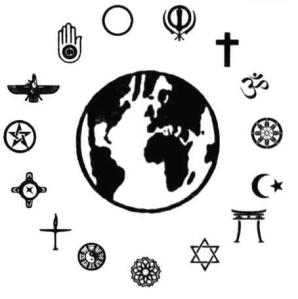For the first 20 years of my life, a conversation about faith was something I unconsciously avoided. It was not that I was uncomfortable with questions of my own faith. Rather, it was the understanding that the source of controversy and division between many people in the homeland of my family and friends was the association of religion. It was my conviction that I would never allow such differences to divide me from the relationships that meant so much in my life.
At the time, my two best friends were a Shia Muslim from Iran and a Jew from Israel. Instead of embracing our differences, naturally, we spent our time enjoying each other’s company and avoiding asking questions regarding religious traditions and questions of faith. I wonder how much more our friendship could have thrived and how much more we could have learned about one another if we had seized the opportunity to embrace our differences and ask those questions, those same questions that we ask in interfaith cafes every week.
Before we left campus for winter break, I was prepared to write an article for the Interfaith Review on my spiritual transformation and what it felt like to be a seeker. As I spoke to my family, friends and co workers about my idea, I was surprised to hear another question that was brought up. Why Interfaith? I was surprised because I was hearing this question from people I would assume would understand and embrace the idea of gathering people of different faith based backgrounds to share ideas and beliefs. More often than not, people were skeptical of the idea. I would like to make it clear that skepticism of the idea is absolutely okay. The beauty of the question is that it has so many layers, and posing a question as simple as “Why Interfaith?” can go in many directions, as it did in our Interfaith Café a couple weeks ago. Being surprised with their reactions was a matter of me forgetting my own past, and my own experiences with interfaith before I became a scholar and was introduced to the idea.
This is what I would like to highlight, the notion that everyone’s experiences with faith and spirituality or lack thereof, no matter how vast or minute, are absolutely essential to the conversation.
This ideal is implemented in our cafes via University Ministry’s initiative of the Four Ways of Dialogue, which begins with the Dialogue of Life, in which people of different faiths and spiritual traditions strive to live in an open and neighborly spirit – includes socializing and hospitality. This, along with the other 3 ways of dialogue, which all include the sharing of religious experience and interreligious collaboration, are what make interfaith so intriguing and promising. The idea is that through dialogue, collaboration and shared intentionality we can strengthen our community by learning about ourselves and our greater community through one another.
I wish that I had a greater knowledge of world religions and spiritualities so that I can give concrete examples to strengthen my argument and answer the question of “Why Interfaith?” But all I can offer is my humble and genuine feeling that interfaith cooperation in our community, on a micro level is an important step to a world of coexistence. I do not mean to over simplify very serious challenges that we face or diminish the struggles that have damaged many religious communities for generations. Instead, I want to make it clear that we can begin to coexist and embrace one another in our own community.
To have a certain belief lends itself to a rejection of another belief. This rejection is not something to be ignored. The way I see it, I cannot strengthen my own ideals and affirm my own character unless I know YOU and your ideas. Through this dialogue and cooperation, imagine what we can accomplish as a community. So many student organizations, both religious and non, do incredible service work for our community. The possibilities only grow when we do this work united, together with one voice. Whether you do it at an interfaith event or not, the next time you get the opportunity I challenge you to be curious, ask questions, listen, share and ultimately, embrace difference.
– Adlil Issakoo
Interfaith Scholar 2009-2010
Published in the March 2010 Issue of the Interfaith Review
